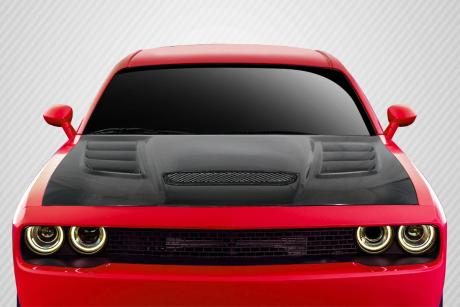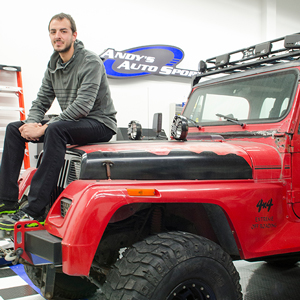Hello, Sign In!
Select Your Vehicle
Select Your Vehicle
Carbon Creations Viper Look Hood



Part #: 113490
$1,837.50
$1,323.00 For each
For each
 For each
For each

Andy's Also Recommends:
-
 Fits: All Jeeps (Universal), Universal - Fits all VehiclesPART # 102655Description: Make sure your new Carbon Creations hood is secured safely with a set of Extreme Dimensions hood pins! Recommended for all carbon fiber and fiberglass hoods, and may be required for warranty. Oh yeah, it also makes your ride look like a race car, even if it isn't!
Fits: All Jeeps (Universal), Universal - Fits all VehiclesPART # 102655Description: Make sure your new Carbon Creations hood is secured safely with a set of Extreme Dimensions hood pins! Recommended for all carbon fiber and fiberglass hoods, and may be required for warranty. Oh yeah, it also makes your ride look like a race car, even if it isn't!
Featured Videos
-
Video Description:In this episode we interviewed Carlos Heriera from Extreme Dimensions (the company that owns and operates Carbon Creations). Here are some highlights from the interview:
*At 1:18, he talks about how Carbon Creations products have shown as much as a 70% weight savings over the factory parts they replace!
*At 2:27, he talks about how hood pins are recommended for their carbon hoods but not necessary, and how they are designed to bolt right in with the factory hinges and latch.
*At 3:23, he says how Carbon Creations is very happy to be having its line sold by Andy's Auto Sport, and how by working together Carbon Creations and Andy's have created a lot of happy customers! -
Video Description:Installing an aftermarket hood can be tricky, but we walk you through it in this video.
*At 0:20, we remove our factory hood.
*At 1:00, we install our new carbon fiber hood. -
Video Description:Heatshield Products keep your engine compartment safe, and can even help protect your vehicle's finish. In this video, we show you how installing a heat shield on your hood can prolong its life and new appearance.
*At 0:42, we get right to installing a Heatshield Products Lava Shield on our project Integra's hood.
*At 2:02, we show you how much cooler our hood's surface is after installing our heat shield. -
Video Description:Everything you need to know about hood pins in one video! In this video, we show you:
*At 0:19, we explain why you need hood pins with an aftermarket hood.
*At 1:30, we tell you about the different types of hood pins available.
*At 2:26, we show you the steps necessary to install a set of hood pins on our project Integra.
Fits On:
2008-2017 Dodge Challenger
Description:
Note: Hood pins are required.
*2x2 twill weave carbon fiber
*Premium gloss, UV-protectant finish
*Track-proven strength and performance
*Up to 70% lighter than OEM factory parts
Note: Hood pins are required.
*2x2 twill weave carbon fiber
*Premium gloss, UV-protectant finish
*Track-proven strength and performance
*Up to 70% lighter than OEM factory parts
Carbon Creations is one of the elite brands that we dub a "Premium Brand" in our online catalog. To earn this distinction, a manufacturer must make products that exhibit cutting edge technology, attention to detail, and widespread popularity. Carbon Creations easily earns this distinction from our perspective. Carbon Creations is one of the largest manufacturers in the world of custom automotive products. They exhibit total professionalism in all facets of their business. If you buy a Carbon Creations product, you can expect a premium product.
Carbon Creations has a reputation for making 'Grade A' carbon fiber products that are free of defects and have a great clear-coat finish. Their carbon fiber hoods are quickly gaining them a solid reputation throughout the industry.
Carbon Creations has a reputation for making 'Grade A' carbon fiber products that are free of defects and have a great clear-coat finish. Their carbon fiber hoods are quickly gaining them a solid reputation throughout the industry.
Featured Videos
-
Video Description:In this episode we interviewed Carlos Heriera from Extreme Dimensions (the company that owns and operates Carbon Creations). Here are some highlights from the interview:
*At 1:18, he talks about how Carbon Creations products have shown as much as a 70% weight savings over the factory parts they replace!
*At 2:27, he talks about how hood pins are recommended for their carbon hoods but not necessary, and how they are designed to bolt right in with the factory hinges and latch.
*At 3:23, he says how Carbon Creations is very happy to be having its line sold by Andy's Auto Sport, and how by working together Carbon Creations and Andy's have created a lot of happy customers! -
Video Description:Installing an aftermarket hood can be tricky, but we walk you through it in this video.
*At 0:20, we remove our factory hood.
*At 1:00, we install our new carbon fiber hood. -
Video Description:Heatshield Products keep your engine compartment safe, and can even help protect your vehicle's finish. In this video, we show you how installing a heat shield on your hood can prolong its life and new appearance.
*At 0:42, we get right to installing a Heatshield Products Lava Shield on our project Integra's hood.
*At 2:02, we show you how much cooler our hood's surface is after installing our heat shield. -
Video Description:Everything you need to know about hood pins in one video! In this video, we show you:
*At 0:19, we explain why you need hood pins with an aftermarket hood.
*At 1:30, we tell you about the different types of hood pins available.
*At 2:26, we show you the steps necessary to install a set of hood pins on our project Integra.
Q: Are hood pins required for a fiberglass or carbon fiber hood?
A: We strongly advise using hood pins on all fiberglass and carbon fiber hoods, as they provide an additional level of safety should the main latch fail or if a strong gust of wind should peel the hood skin away from its skeleton. In addition, lift-off “race weight” fiberglass hoods require hood pins on all four corners, as they do not have provisions for latches or hinges.
Q: Do carbon fiber hoods come pre-drilled for hood pins?
A: No. Since there are many different styles of hood pins available, it is up to our customers to drill the holes themselves to ensure a perfect fit.
Q: How do you install a carbon fiber hood?
A: Carbon fiber hoods are usually OEM fit and finish which means un-bolting your factory hood and replacing it with the new lightweight carbon hood. Little to no modification is needed to get these to fit properly, and they often come with OEM metal latches for an easy installation. Nevertheless, hood pins are recommended for use with all carbon fiber hoods.
Q: Will I have to paint my carbon fiber hood when I receive it?
A: No. In fact, for a lot of people the whole reason for buying a carbon hood is to get that new-age cutting edge race look. The hood has a clear-coat finish and can literally be installed on your car out of the box. Because carbon hoods are made to be installed without painting, they are often a more affordable option than fiberglass or steel hoods after you account for the paint cost. (For anyone who really wants to paint a carbon hood, it is indeed possible since the clear coat finish responds well to primer.)
Q: Why buy a carbon fiber hood?
A: Carbon fiber hoods give cars a fantastic custom race look that is very popular. Carbon fiber hoods come with a clear gelcoat that allows you to see the clean weave of the carbon fiber and that makes it so you don't have to paint your hood. Additionally, carbon fiber hoods are almost always lighter than factory hoods, so they can help you improve performance. Vented carbon hoods are a great option because they relieve your engine of trapped heat, are lighter weight than factory hoods, and give your car a race car appearance.
Q: Are there different "grades" or qualities of carbon fiber hoods?
A: Yes. The terms carbon is used loosely. Some companies make the entire hood (skin and skeleton) out of carbon. This is rare since carbon is an expensive material. Some manufacturers make the hood skin out of carbon, and make the skeleton out of fiberglass. Some companies make their hoods out of fiberglass, and paint it to look like carbon fiber, but call them carbon fiber hoods (but of course, they are just a carbon look, not actual carbon fiber). To know what "grade" a carbon hood is made of, look for details in the product description or manufacturer description.
Q: The hood I'm considering buying from Andy's is vented and has openings in it that appear to expose it to rain. Should I be concerned about that? Will it be harmful to my vehicle if rain goes through those vents into my engine bay? Is there a way to protect against that from happening?
A: Adding guards could potentially defeat the purpose of a vented hood, which is to help cool your engine bay. Some customers do get creative and add their own diverters under the hood for a custom solution to the perceived problem, but you would have to figure out how to attach them and whether there's room under the hood in the first place. That being said, we have never heard of any problems running a vented hood as-is, and we've done it ourselves for many years without any issues to speak of.
Q: Do you have to buy hood pins if you buy a carbon fiber hood?
A: Hood pins are not necessary when buying a carbon fiber hood if it comes with an OEM metal latch, but we do recommend them as a safety precaution. They are sold separately on our website. If the carbon fiber hood does not come with a latch, hood pins are mandatory to be able to close your hood. We always suggest buying hood pins when purchasing any light-weight hood for peace of mind; you don't want any chance of your hood flying into your windshield while you're cruising along on the highway!
Q: Do carbon fiber hoods require any prep work like fiberglass hoods?
A: No. Carbon fiber hoods come prefinished and ready to install out of the box, although they may require some adjustment to sit correctly. As always, we suggest adding a set of hood pins as an extra safety measure when installing lightweight hoods.
A: We strongly advise using hood pins on all fiberglass and carbon fiber hoods, as they provide an additional level of safety should the main latch fail or if a strong gust of wind should peel the hood skin away from its skeleton. In addition, lift-off “race weight” fiberglass hoods require hood pins on all four corners, as they do not have provisions for latches or hinges.
Q: Do carbon fiber hoods come pre-drilled for hood pins?
A: No. Since there are many different styles of hood pins available, it is up to our customers to drill the holes themselves to ensure a perfect fit.
Q: How do you install a carbon fiber hood?
A: Carbon fiber hoods are usually OEM fit and finish which means un-bolting your factory hood and replacing it with the new lightweight carbon hood. Little to no modification is needed to get these to fit properly, and they often come with OEM metal latches for an easy installation. Nevertheless, hood pins are recommended for use with all carbon fiber hoods.
Q: Will I have to paint my carbon fiber hood when I receive it?
A: No. In fact, for a lot of people the whole reason for buying a carbon hood is to get that new-age cutting edge race look. The hood has a clear-coat finish and can literally be installed on your car out of the box. Because carbon hoods are made to be installed without painting, they are often a more affordable option than fiberglass or steel hoods after you account for the paint cost. (For anyone who really wants to paint a carbon hood, it is indeed possible since the clear coat finish responds well to primer.)
Q: Why buy a carbon fiber hood?
A: Carbon fiber hoods give cars a fantastic custom race look that is very popular. Carbon fiber hoods come with a clear gelcoat that allows you to see the clean weave of the carbon fiber and that makes it so you don't have to paint your hood. Additionally, carbon fiber hoods are almost always lighter than factory hoods, so they can help you improve performance. Vented carbon hoods are a great option because they relieve your engine of trapped heat, are lighter weight than factory hoods, and give your car a race car appearance.
Q: Are there different "grades" or qualities of carbon fiber hoods?
A: Yes. The terms carbon is used loosely. Some companies make the entire hood (skin and skeleton) out of carbon. This is rare since carbon is an expensive material. Some manufacturers make the hood skin out of carbon, and make the skeleton out of fiberglass. Some companies make their hoods out of fiberglass, and paint it to look like carbon fiber, but call them carbon fiber hoods (but of course, they are just a carbon look, not actual carbon fiber). To know what "grade" a carbon hood is made of, look for details in the product description or manufacturer description.
Q: The hood I'm considering buying from Andy's is vented and has openings in it that appear to expose it to rain. Should I be concerned about that? Will it be harmful to my vehicle if rain goes through those vents into my engine bay? Is there a way to protect against that from happening?
A: Adding guards could potentially defeat the purpose of a vented hood, which is to help cool your engine bay. Some customers do get creative and add their own diverters under the hood for a custom solution to the perceived problem, but you would have to figure out how to attach them and whether there's room under the hood in the first place. That being said, we have never heard of any problems running a vented hood as-is, and we've done it ourselves for many years without any issues to speak of.
Q: Do you have to buy hood pins if you buy a carbon fiber hood?
A: Hood pins are not necessary when buying a carbon fiber hood if it comes with an OEM metal latch, but we do recommend them as a safety precaution. They are sold separately on our website. If the carbon fiber hood does not come with a latch, hood pins are mandatory to be able to close your hood. We always suggest buying hood pins when purchasing any light-weight hood for peace of mind; you don't want any chance of your hood flying into your windshield while you're cruising along on the highway!
Q: Do carbon fiber hoods require any prep work like fiberglass hoods?
A: No. Carbon fiber hoods come prefinished and ready to install out of the box, although they may require some adjustment to sit correctly. As always, we suggest adding a set of hood pins as an extra safety measure when installing lightweight hoods.
If you live in California, please note this item may be subject to a Proposition 65 warning. Click here to learn more.



When you click on links to various merchants on this site and make a purchase, this can result in this site earning a commission. Affiliate programs and affiliations include, but are not limited to, the eBay Partner Network.
Not able to find what you are looking for?


For Audi A7 S7 RS7 Real Carbon Fiber Engine Hood Bonnet Cover Trim 2011-2018

For 2018-2024 BMW 5 Series M5 G30 AG style Carbon Fiber Hood

for 2013-2020 GS F GS350 GS200t GS300 Lexus DT style vented Carbon Fiber Hood

For Audi TT TTS TT RS 2015-2020 Real Carbon Fiber Front Hood Vented Bonnet Cover

🔥 *NEW* Seibon 04-05 Subaru WRX/STi RS Carbon Fiber Hood HD0405SBIMP-RS Blobeye






